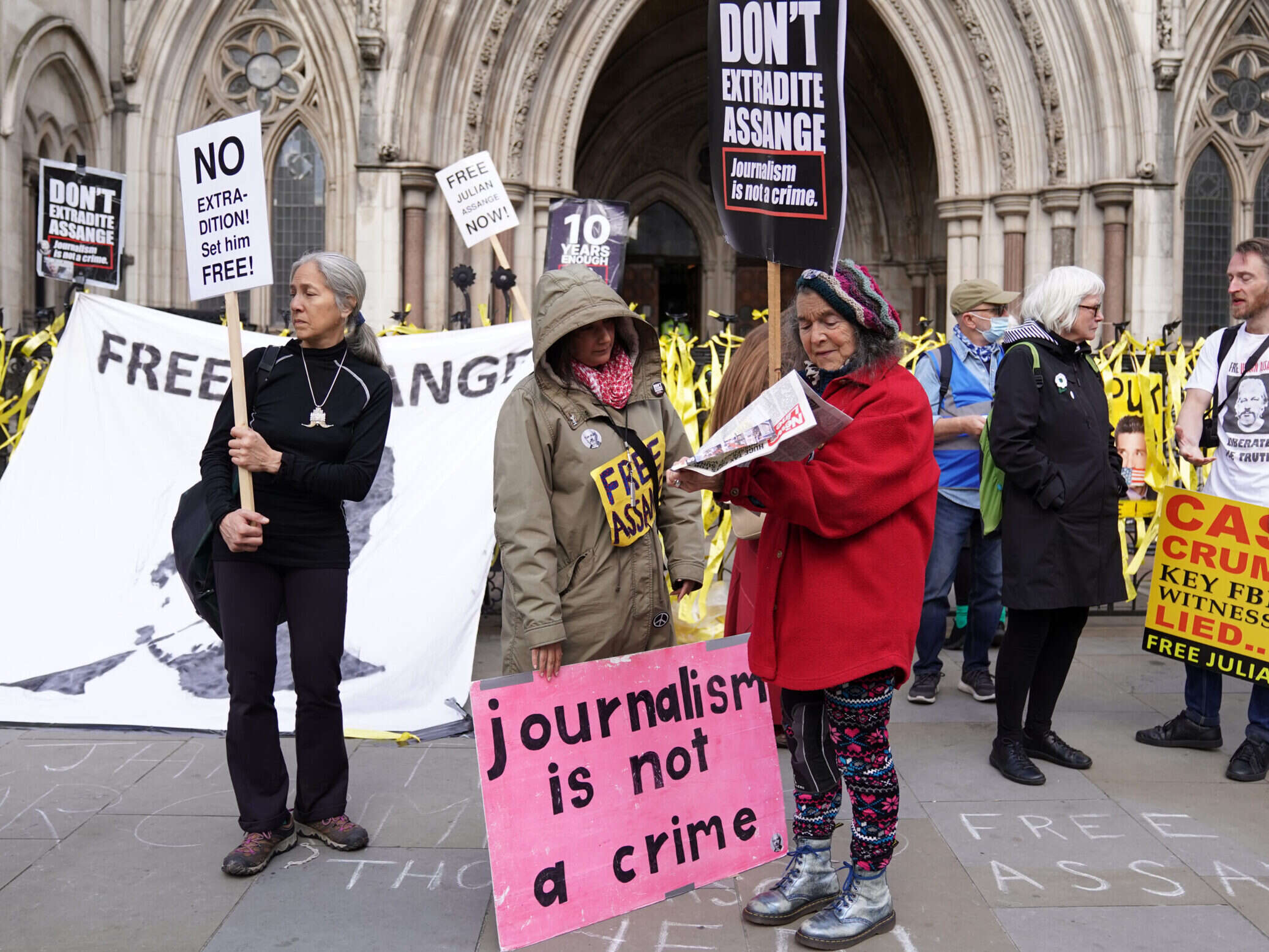
Lawyers for Julian Assange have opposed an attempt by the US to overturn the block to his extradition, arguing that assurances over its potential treatment of him are “meaningless” and “vague”.
Assange, 50, is wanted in America on allegations of a conspiracy to obtain and disclose national defence information following WikiLeaks’s publication of hundreds of thousands of leaked documents relating to the Afghanistan and Iraq wars.
Then-District Judge Vanessa Baraitser ruled in January, following a multi-week hearing, that Assange should not be sent to the US, citing a real and “oppressive” risk of suicide.
On Thursday, the High Court in London began hearing a second day of legal arguments as the US challenges the district judge’s decision.
In written submissions, Edward Fitzgerald QC, for Assange, said the judge had produced a “carefully considered and fully reasoned judgment”, adding it was “clear” she had “scrupulously applied the test for oppression in cases of mental disorder”.
He told the court: “It is perfectly reasonable to find it oppressive to extradite a mentally disordered person because his extradition is likely to result in his death,” adding that a court must be able to use its power to “protect people from extradition to a foreign state where we have no control over what will be done to them”.
He added the district judge’s conclusion was “justified” because Assange, who did not attend Thursday’s hearing, “would be driven by his disorder to find a way to commit suicide whatever preventative steps were taken”.
Fitzgerald added: “These findings arose primarily from the nature of Mr Assange’s mental disorder and his fears of extradition given the wholly exceptional nature of his case.
“There is nothing to suggest that these factors have changed in the least bit since the extradition hearing.”
On Wednesday, the court was told that blocking Assange’s removal to the US due to his mental health risks “rewarding fugitives for their flight”.
James Lewis QC, for the US, said the district judge based her decision on Assange’s “intellectual ability to circumvent suicide preventative measures”, which risked becoming a “trump card” for anyone who wanted to oppose their extradition regardless of any resources the other state might have.
He told the court the district judge “entirely based her decision” on the risk Assange would be submitted to special administrative measures (SAMs) and detained at the ADX Florence Supermax jail, if extradited.
However, he said four “binding” diplomatic assurances had been made, including that it would consent to him being transferred to Australia to serve any prison sentence he may be given, which “fundamentally change the factual basis” of her judgment.
But Fitzgerald said the “qualified and conditional assurances” were produced “too late to be properly tested” and “do not undermine the principal findings” of the district judge who applied the law “strictly and entirely properly”.
He added: “All are caveated, vague, or simply ineffective. None offer any concession or assurance against the application of existing US practice.”
Fitzgerald said the assurance that Assange could be transferred to a prison in Australia if convicted is “meaningless”, adding that Assange “will most likely be dead before it can have any purchase, if it ever could”.
He added that assurances not to impose SAMs on Assange or hold him at ADX Florence pre-trial or post-conviction do not remove the risk of “conditions of administrative isolation”.
Fitzgerald said he did not accept Lewis’s argument that “once SAMs [special administrative measures] and ADX [the “Supermax” Administrative Maximum Facility (ADX) in Florence, Colorado] are taken out you can safely say the district judge would not have answered the relevant questions as she did”.
The court was told the US had previously attempted to “minimise the reality of the regimes which those subject to SAMs and ADX endure, and the effects it has on their mental health”.
Fitzgerald also said an assurance over medical care is “limited” and “does not guarantee receipt of psychological treatment recommended by a qualified psychologist”.
Assange’s barrister also challenged Lewis’s claim that evidence from Assange’s psychiatric expert, Professor Michael Kopelman, should have been dismissed or had less weight attributed to it after he was found to have misled the district judge.
Fitzgerald said it was “not true” that the district judge found the professor had misled the court, adding his “omissions” in an initial December 2019 report over Assange’s relationship with Stella Moris were due to “understandable caution” over her identification as his partner.
The judge concluded Prof Kopelman’s actions were “an understandable human response” to Moris’s situation, Fitzgerald said, adding it “did not invalidate his overall independence and impartiality”.
He noted that Prof Kopelman’s actions arose from concerns about a risk to Moris’s safety and privacy and highlighted evidence from anonymous Spanish witnesses on Assange being under “extreme measures of surveillance” at the Ecuadorian Embassy, the “targeting” of Moris and her children and discussions “about kidnapping or poisoning him”.
Assange has been held in Belmarsh Prison since 2019 after he was carried out of the Ecuadorian embassy in London by police before being arrested for breaching his bail conditions.
He had entered the building in 2012 to avoid extradition to Sweden to face sex offence allegations, which he has always denied and were eventually dropped.
The two-day hearing before the Lord Chief Justice Lord Burnett and Lord Justice Holroyde is expected to end on Thursday with a decision at a later date.
Picture: PA Wire/Kirsty O’Connor
Email pged@pressgazette.co.uk to point out mistakes, provide story tips or send in a letter for publication on our "Letters Page" blog
